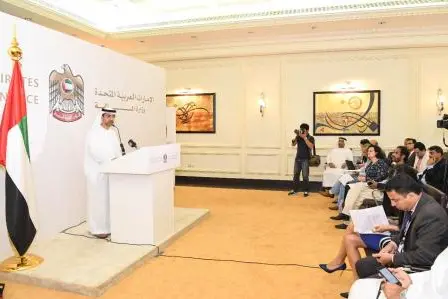PHOTO
Abu Dhabi: As the entity responsible for the legislative aspects of the tax system in the United Arab Emirates, and committed to its role in raising tax awareness, The Ministry of Finance held a briefing this morning at its headquarters in Abu Dhabi, to define in detail the Executive Regulation of Federal Decree Law No. (8) of 2017 on VAT.
HE Younis Haji Al Khoori, Undersecretary of MoF reviewed the main points of VAT implementation, foremost of which is the commitment of the UAE to apply VAT as per the GCC joint agreement, which falls in line with international best practice.
At the beginning of the briefing, HE welcomed representatives of the media and stressed their important role in raising awareness and disseminating correct information about the Ministry's message to the wider community. He went on to emphasise how the support of the media will aid in policy implementation and the wider realisation of the UAE leadership’s vision in building a diversified and sustainable economy.
HE pointed out that the tax system would support the economic development witnessed by the UAE, as well as enable it to compete with the world's most advanced economies. It will do so by providing resources to support the expansion of key sectors most closely related to the community developing the best services, especially in the areas of healthcare, education and infrastructure.
HE highlighted the cooperation and coordination between MOF and the Federal Taxation Authority in various aspects related to taxation, particularly in the implementation of intensive awareness campaigns. These campaigns were designed with the aim to better prepare the business sector in ensuring its alignment with the tax system as the 1 January 2018, date of implementation approaches. HE said: “All companies should cooperate and respond to the requirements of the Federal Tax Authority to speed up the process of tax registration.”
HE stressed on the importance of the Executive Regulations of Federal Decree-Law No. (8) of 2017 on Value Added Tax, as a fundamental step in implementing an effective tax system, in accordance with the best international standards, to improve the services of key sectors and the lives of the community. HE said: “Value Added Tax plays a key role in achieving the leadership's vision of reducing oil dependency and building a sustainable knowledge economy. This will contribute to advancing development by providing additional sources of income for the expansion of infrastructure projects.”
HE added: “VAT was introduced in the UAE after in-depth studies indicating that there would be no impact on the business sector and the investment environment in the country, nor would it affect the country’s position and competitiveness should it be implemented. In fact the UAE will implement the lowest VAT tax rate on a global level, with the aim of reaching the highest levels of happiness within the UAE community.” The UAE has completed all legislative requirements to ensure that the implementation of its tax system is the best globally. The Ministry of Finance has also authorized the issuance of tax-related legislation and policies, as well as the establishment of legal frameworks to start the application of value added tax at the beginning of next year without any delay. The Executive Regulations of Federal Decree-Law No. (8) of 2017 constitute an integrated legislative framework that defines all mutual obligations between the Federal Tax Authority and the taxpayer, and contribute to an ideal environment based on the highest standards of governance and transparency. The regulations state all obligations of parties concerned with the value added tax system, which in turn will constitute an important support for developing the infrastructure for the future and upgrading public services provided by the government to citizens and residents alike.
HE added: “The Ministry of Finance has been working according to a clear and integrated plan, in coordination with the Federal Tax Authority, with an aim to reach the highest international standards in the implementation of tax procedures. Once the Ministry completed all the legislative steps and procedures, the Federal Tax Authority proceeded to quickly finalise the list of requirements for tax applications, to enable companies to become better prepared for the VAT— by working to align their own financial systems and operations with these taxation requirements.”
HE added: "We have made great efforts in the recent past, to ensure easy implementation of the tax procedures, through the development of an integrated legislative system according to the highest international standards. These are enacted according to an integrated approach that contributes to providing the necessary knowledge, which enables the business sector to implement the VAT system in a simplified manner, according to best practices, thereby contributing towards a more competitive nation with facilitated business procedures."
HE concluded his speech by thanking all governmental institutions and chambers of commerce in the UAE, which have been working side by side with both the Ministry and the Authority to communicate with all business sectors in the introduction of tax procedures. He also praised the role of the national media as a key partner in the implementation of all developmental plans in the UAE.
The Ministry of Finance and the Federal Tax Authority have held a series of workshops aimed at building awareness around the new VAT system, including its role in the fulfilment of our leadership’s vision to build a sustainable knowledge economy for future generations. With an aim to facilitate and streamline the procedures, the Federal Tax Authority currently provides tax evidence and information on its website, and has already opened up the registration process online. This platform was designed according to the best technical standards, in order to accommodate taxpayers, visitors and every member of the community 24/7.
-Ends-
© Press Release 2017



















